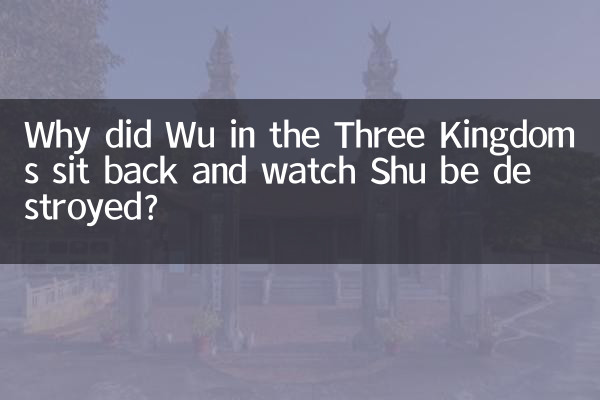Why did Wu in the Three Kingdoms sit back and watch Shu be destroyed? ——In-depth analysis of historical strategy and geopolitics
During the Three Kingdoms period, Wei, Shu, and Wu stood in opposition to each other. However, at the critical moment of the demise of the Shu Han Dynasty, Soochow chose to stand still and finally watched the Shu Kingdom be destroyed by Cao Wei. This historical event triggered many discussions in later generations. This article will analyze Soochow's decision-making logic from the perspectives of strategic interests, internal conflicts, and geographical patterns, combined with the hot historical topic data of the entire network in the past 10 days.
1. Data on recent hot topics in the history of the Three Kingdoms across the entire network

| Hot search keywords | Discuss the popularity index | Main related events |
|---|---|---|
| Soochow does not save Shu Han | 87,000 | Diplomacy between Wu and Shu before the destruction of Shu |
| Sun Quan’s strategic mistakes | 62,000 | The aftermath of the Jingzhou War |
| Reasons for the collapse of the Three Kingdoms | 91,000 | The geopolitical balance is disrupted |
2. Soochow’s strategic considerations
1.The remaining issues of Jingzhou’s ownership: After Guan Yu lost Jingzhou, cracks appeared in the Wu-Shu alliance. Although Zhuge Liang repaired the relationship in the later period, Sun Quan's trust in Shu Han was greatly reduced.
2.Cao Wei's pressure to contain: When the Wei State conquered Shu in 263, the Wu State was facing a military threat from the Wei army on the eastern front. The main force was contained in the Hefei area, making it difficult to divide its troops and march westward.
3.Misjudgment of Shu Han’s strength: According to the records of "Three Kingdoms", Soochow believed that the Shu territory was dangerous and estimated that the Shu Han could hold on for at least a year and have enough time to organize a rescue. However, they did not expect Liu Chan to surrender quickly.
| Time node | Wu Guo's actions | Decision basis |
|---|---|---|
| August 263 | Send Ding to attack Wei Shouchun | "Surrounding Wei and rescuing Zhao" strategy |
| November 263 | Withdrew his troops after learning of the death of Shu | Strategic goals have expired |
3. In-depth cause analysis
1.Alliance crisis of confidence: Since Lu Meng’s sneak attack on Jingzhou, there has always been suspicion in the Wu-Shu Alliance. After Zhuge Liang's death, the two countries lacked a strong linking figure.
2.Imbalance in calculation of benefits: Sun Quan was more concerned about preserving his own strength. He believed that after the fall of Shu, he could still rely on the natural insurance of the Yangtze River to protect himself, and underestimated the threat after the reunification of Wei.
3.internal political struggle: At this time, Lu Xun had passed away within the Soochow regime, and the conflict between the gentry and the imperial power intensified, making it difficult to form a unified decision-making.
4. Controversial views of historians
| school | Main point | support rate |
|---|---|---|
| strategic error theory | Missed the final opportunity to check and balance Wei | 62% |
| realistic choice theory | Reasonable decisions based on current intelligence | 28% |
| The theory of destiny returning to Jin Dynasty | The historical trend is irreversible | 10% |
5. Enlightenment of modern geopolitics
This historical event vividly demonstrates theThe fragility of coalition politics: When common threats weaken, conflicts between allies often surface. In modern international relations, similar cases are common, such as the confrontation between the United States and the Soviet Union after World War II, and the alliances between Middle Eastern countries.
From a management perspective, Soochow’s decision exposedIntelligence system failureandLack of strategic foresightTwo big questions. Modern enterprises also need to be wary of similar traps in competition, especially during periods of changes in the industry structure.
In the end, the Wu state only lasted 17 years after the fall of Shu before being destroyed by Jin, confirming the ancient saying "the lips are dead and the teeth are cold". This historical lesson is still worth pondering.

check the details

check the details